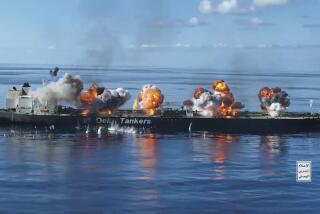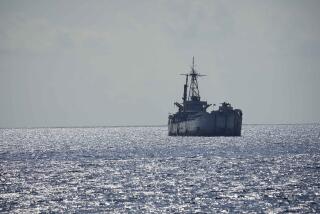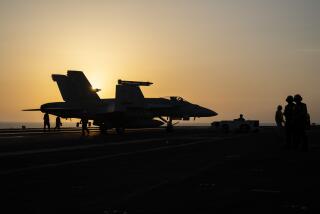Iraqi Ship Fails to Halt Despite Warning Shots
- Share via
DHAHRAN, Saudi Arabia — An Iraqi merchant ship ignored more than 40 warning shots blasted across its bow by an American destroyer Sunday in an act of defiance that raises the prospect of a new confrontation at sea.
The tense situation in the Persian Gulf continued after daybreak today as the Iraqi vessel sailed toward the Yemeni port of Aden after its captain made clear to the Navy destroyer O’Brien that he does not intend to return to Iraq, military officials said.
The officials said that the Iraqi ship, the Al Bahar al Arabi, had been shadowed overnight by an Italian frigate. The Navy said it could not discuss “future U.S. involvement in this intercept.”
But one U.S. official noted that American warships were positioning themselves in front of the Iraqi ship and could seek to block its path this morning.
The Iraqi ship’s refusal to halt, despite a fierce display of American firepower, marks the first time since the very first weeks of the U.N.-imposed embargo in August that a ship has refused to halt when warning shots have been fired.
The incident comes in the wake of indications that masters of Iraqi ships have received new orders from their companies--and perhaps from the Iraqi government--to refuse to heed the orders of foreign navies, according to senior American commanders.
The Iraqi ship initially submitted to a search of its cargo by a U.S. Navy boarding party after first being challenged by the O’Brien on Saturday, according to Lt. Cmdr. J. D. Van Sickle, a Navy spokesman here.
The vessel was found to be carrying prohibited cargo and was ordered to either return to Iraq or be diverted to another port for unloading. According to the Navy account, the Iraqi master agreed to return to Iraq.
After the boarding party departed, however, the vessel instead continued on its southward course toward the Strait of Hormuz and ignored repeated radio requests to halt.
The American destroyer Sunday fired the first of 40 warning shots, including 15 shells from a 25-millimeter cannon and two larger projectiles from the ship’s five-inch deck gun--its largest--in what the Navy described as an effort to “gain (the Iraqi ship’s) attention.”
But the 400-foot-long Iraqi vessel stayed on its course. In radio communications with the American vessel, the ship’s master “indicated he did not intend to adhere to O’Brien’s directions to return to Iraq,” the Navy said.
The apparent new instructions to Iraqi captains to refuse orders to halt would mark a reversal from what U.S. officials have described as earlier orders that they cooperate. The American commanders who described the turnabout said in recent interviews that Iraqi captains now fear retribution against their families if they submit to a search.
Since Aug. 2, when Iraq invaded Kuwait, the United States has fired warning shots at half a dozen Iraqi vessels to force them to halt and submit to a search. The only other incidents in which Iraqi vessels ignored warning shots came on Aug. 18, about two weeks after the U.N.-imposed embargo began, when U.S. ships fired warning shots over two Iraqi tankers in the Persian Gulf and the Gulf of Oman.
The degree of tension in Sunday’s incident was indicated by the heavy volume of fire from the U.S. warship in its effort to stop the Iraqi vessel. Military officials said U.S. and other naval ships enforcing the sanctions generally rely exclusively on smaller, 50-caliber machine guns.
A report from a British journalist aboard a warship in the gulf indicated that ships in the region have been placed on a higher level of alert, but the account could not be immediately confirmed.
As the Iraqi ship continued toward the Strait of Hormuz on Sunday night, the Navy said that it was being tailed by the Italian vessel Libeccio.
A Navy spokesman said this morning that the 7,000-ton Al Bahar al Arabi passed through the strait overnight and was now in the Gulf of Oman. He said that the boarding party found the vessel was carrying steel pipe and plywood from Iraq to Aden.
The Libeccio and O’Brien are among nearly 100 ships participating in the multinational operation to enforce the economic sanctions against Iraq. So far, more than 2,500 ships have been intercepted.
Of those vessels, 240 have been boarded, 191 of those by the United States, the Navy said Sunday night.
In another development Sunday in the gulf crisis, former British Prime Minister Edward Heath met for three hours with Iraqi President Saddam Hussein. Heath said he won agreement for the release of a number of sick and elderly Britons held by Baghdad.
Also, motorists in Iraq waited in long lines at gas stations for a second day in a row, trying to beat the deadline for gasoline rationing, scheduled to start Tuesday. But Iraq’s official media denounced the trade embargo as a failure.
More to Read
Sign up for Essential California
The most important California stories and recommendations in your inbox every morning.
You may occasionally receive promotional content from the Los Angeles Times.










